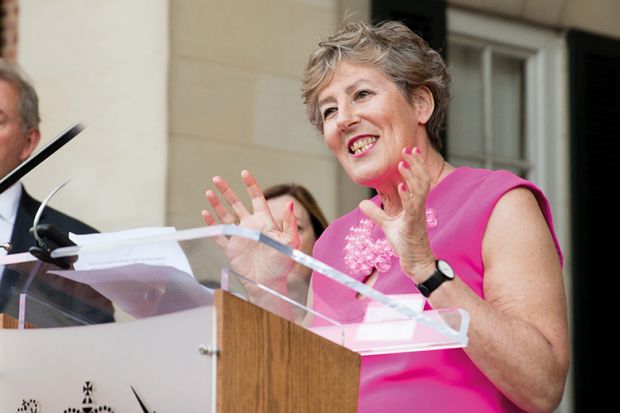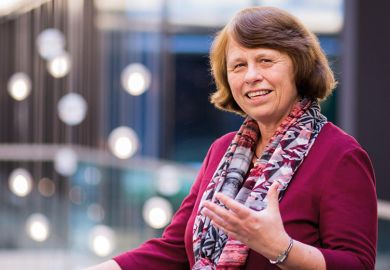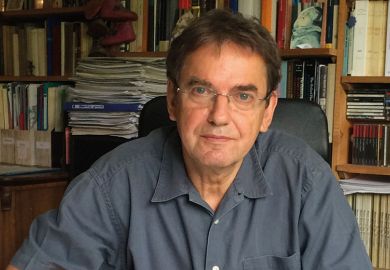Penny Egan announced earlier this year that she was retiring after more than a decade as executive director of the Fulbright Commission, which supports academic exchange between the UK and the US and turns 70 this year. Ms Egan, who was awarded a CBE in 2013 for her services to international education, was previously the first woman to head the Royal Society for the Encouragement of Arts, Manufactures and Commerce. Prior to that she worked in media relations at 10 Downing Street and the Victoria and Albert Museum.
Where and when were you born?
London in 1951. I have lived in London all my life except for my three years at the University of Leicester. I have moved many times but only within the radius of just over a mile.
How has this shaped who you are?
I feel everyone needs a core of stability around which you can be bold and take risks. My strength has come from a very stable marriage (sadly my husband died very young two years ago from a rare form of dementia), close friends, children (now grown) who have become very successful adults, and a sense of belonging to and being rooted in a local community.
What kind of undergraduate were you?
A diligent one. Friends reminisce about their university days and the sun was clearly always shining. In Leicester it seemed to be always raining and I was always studying. So although I enjoyed the academic side and made good friends, on reflection, these were not the happiest days of my life. I am not an intellectual – but rather an intellectual groupie. I was never going to do a postgrad degree and in fact all my life I have run away from any job that would require me to become a specialist. So my first job at the RSA running its very eclectic lecture programme was probably my favourite role.
What’s your most memorable moment at university?
There were only four of us in the third year taking history of art, and three members of the faculty. We got to know each other quite well, and I remember cooking a complicated Indian meal for our tutors on a one-ring burner.
What are the best and worst things about your job?
It is very satisfying to see that you have made a tangible difference. When I arrived at the commission we had 39 Fulbright awards in total and a decreasing budget. Now we have increased funding from external sources from £1.3 million to £4.8 million, and this year we have given 130 awards to students and academics. With the Sutton Trust we have introduced a social mobility programme to get state-educated, academically able but economically challenged students into some of the best US universities with generous financial aid. The worst thing is having to turn away so many well-qualified applicants.
What advice do you give to Fulbright students?
The programme is about cultural exchange as much as enhancing your knowledge and skills. Go with an open mind, immerse yourself in the experience and take every opportunity to get to know and understand the people and the country.
What will you miss most about working at the Fulbright Commission?
I have been in work since I left university in 1972, so not having a nine-to-five job to go to will take some getting used to. Fulbright has also been the first job where I have worked closely with international colleagues. Reporting into the US State Department – from whence comes half of our small but essential core grant (the other half comes from the Department for Education) and advocating for the programme “on the Hill”, as they say, has also been eye-opening.
What keeps you awake at night?
Whether the line in the US federal budget that funds the global Fulbright programme will get through Congress without any cuts.
What has changed most in higher education in the past five to 10 years?
Student mobility and the internationalisation of universities. It is instructive to see just how many European Union nationals we have attracted to our UK universities and I wonder how many of them will stay and make their long-term careers here after Brexit.
What brings you comfort?
My grandchildren and their infectious enthusiasm for life.
What saddens you?
Waste – in terms of both the throwaway culture and overuse of scarce resources. And the 50 per cent of young people who don’t go to university and whom we tend to write off as failures. What a waste of talent.
If you were the universities minister for a day, what policy would you immediately introduce to the sector?
Increase mobility by making student loans portable to allow many more to undertake their degrees abroad. And get the prime minister to stop counting international students in the immigration figures.
What’s your biggest regret?
I retire at the end of the year, and was planning to travel and enjoy all those things with my husband that you save for when you are no longer working. I regret now that I will have no one to share them with.
Do you live by any motto or philosophy?
Be yourself. For many years I looked over my shoulder, afraid my elders and betters would be judging me. In later years I have come to believe that you need to have the confidence to just be yourself. Life is too short, so to hell with what others think about you.
anna.mckie@timeshighereducation.com
Appointments
Liz Mossop has joined the University of Lincoln as its new deputy vice-chancellor for student development and engagement. Professor Mossop, who will focus on teaching and learning, student engagement and employability, is a former professor of veterinary education at the University of Nottingham. Professor Mossop has an “outstanding track record for innovation in curriculum design, teaching and learning and above all a strong commitment to students and their development”, said Mary Stuart, Lincoln’s vice-chancellor.
Liz Bacon has been appointed vice-principal and deputy vice-chancellor (academic) at Abertay University. Professor Bacon will join the university in September from the University of Greenwich, where she is a deputy pro-vice-chancellor. An expert in computing security and technology enhanced learning, Professor Bacon will also be a professor of computer science at Abertay. “Liz has an outstanding record as an academic leader, and her passion for student learning and for research fits perfectly with our ethos at Abertay,” said principal Nigel Seaton.
Diana Beech, the Higher Education Policy Institute’s director of policy and advocacy, has been named policy adviser to Sam Gyimah, the UK’s minister for universities and science. Dr Beech, who joined Hepi in March 2017, is a former programme manager at the Department for Education, where she was responsible for establishing the Office for Students, and has held postdoctoral positions at University of British Columbia and the Technical University of Berlin.
Kerry Sanderson, former governor of Western Australia, is to become the first female chancellor of Edith Cowan University. She will succeed Hendy Cowan in January when he steps down from the Perth university after 14 years in the role.
Caroline Bysh is to become the director of marketing, digital and communications at Scotland’s Rural College. Ms Bysh, a former director of marketing and recruitment at the University of Reading, joins SRUC’s executive leadership team in August.
Register to continue
Why register?
- Registration is free and only takes a moment
- Once registered, you can read 3 articles a month
- Sign up for our newsletter
Subscribe
Or subscribe for unlimited access to:
- Unlimited access to news, views, insights & reviews
- Digital editions
- Digital access to THE’s university and college rankings analysis
Already registered or a current subscriber?





